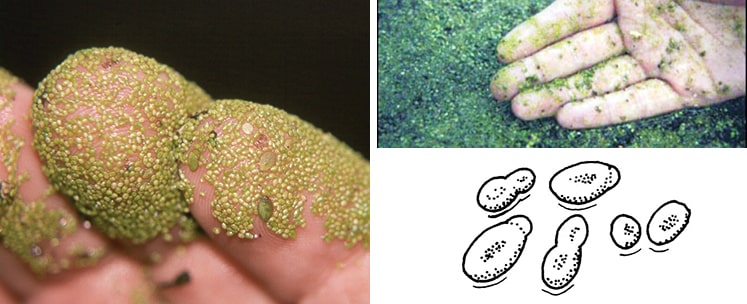Watermeal

Description
Watermeal is a very tiny, light green, free-floating plant that resembles specks of cornmeal. In fact, Watermeal is the smallest seed-bearing plant in the world. Watermeal tends to grow in dense colonies in quiet, undisturbed water. Often Watermeal will be associated with colonies of duckweeds. Watermeal can be an aggressive invader of ponds and are often found mixed in with duckweeds or mosquito fern. If colonies cover the surface of the water, then oxygen depletion and fish kills can occur. These plants should be controlled before they cover the entire surface of the pond.
Other Names: Wolffia
Mechanical Control
Watermeal can be controlled by raking or skimming it off the pond's surface. This can rather difficult due to the small size of watermeal.
Watermeal typically prefers stagnant and slow moving water. By adding an aeration system, you can eliminate Watermeal completely or limit the growth to the edges which are easily reachable with a net.
Chemical Control
Broad spectrum contact herbicides, such as Ultra PondWeed Defense or KnockDown Defense, will quickly kill any part of the plant it touches but multiple treatments may be needed throughout the season.
Chemical Application Best Practices
Anytime you use chemicals treat weeds or algae, please keep in mind the following:
- Treat your pond in sections. Treat only half the pond's surface at a time. During hot weather or when treating heavy growth, it is important to treat no more than 1/4 of your pond at a time and wait the full 14 days before re-applying. This helps lower the risk of fish loss during hot weather or when treating heavy growth.
- Once the weeds have browned, use a rake to remove as much dead material as possible. This prevents an accumulation of dead plant material and muck.
- Take a proactive approach to pond management. Use PondClear, MuckAway and Pond Dye to keep your pond looking great. For more information, see our article on the Airmax Ecosystem.
Ask an Expert
If you're unable to identify your pond weed(s) using our Weed ID Guide, send us a photo so we can help you out. And if you have any additional questions about duckweed or how to get rid of duckweed in your pond, feel free to reach out to our customer service team and we'll be happy to assist you.